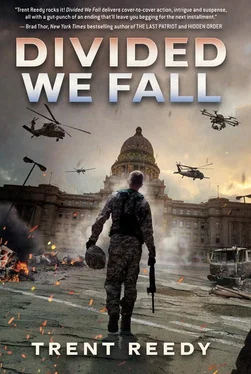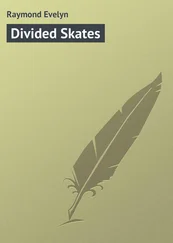We didn’t waste any time. Our squad and team leaders had everybody pack for a weekend in the field, checking to make sure we had everything we needed.
“Hey, Wright, I finally figured out what PMCS stands for,” Luchen said later when we were looking for leaks or other mechanical problems on our five-ton truck.
He was winding me up for a joke, but I wasn’t in the mood. “Preventative—”
“Preventative Maintenance Checks Suck!” He snickered with that idiotic laugh of his.
“Good one,” I said.
Luchen’s smile faded. “About McFee. Do you think it was our fault?”
My throat burned with that acid feeling that came right before I puked. Why did he have to ask me this? It wasn’t our fault. It was my fault. I’d started the whole mess that had torn McFee up bad.
“Clear your fingers,” Luchen said right before he slammed the truck’s hood closed. “Because I was thinking that maybe if we’d tried to—”
“Damn it, Luchen, what did I tell you about thinking?” Sergeant Meyers’s big form rounded the front of the truck next to ours. “The lieutenant killed himself because he was a coward. He didn’t have the guts or strength to deal with life. Now, I don’t want to hear any more of this kind of talk. Get this truck ready. We’re rolling out in fifteen minutes!”
I had always kind of disliked Staff Sergeant Meyers, but now I hated him. Enlisted soldiers never got to know officers very well, and I had known Lieutenant McFee even less than most. But it wasn’t hard to see that he’d been devastated by everything that had gone wrong at Boise. He must have wondered what he could have done differently to prevent the bloodshed. He actually cared about the people who were hurt there, couldn’t get the images of the blood and the memory of the screams out of his mind. It was cutting him up inside, burning in his dreams. Wanting to find a way to end all that pain didn’t make him a coward. It made him human.
I felt a hand on my shoulder and turned to see Specialist Sparrow. “You okay?”
“He wasn’t a coward,” I said quietly, struggling to keep myself together.
Sparrow gave my shoulder a squeeze. “I know he wasn’t,” she said. “Don’t listen to Meyers. He’s an asshole.”
I nodded and we finished up with the truck so we could get it in line for the convoy. I was picked as codriver, riding with my unloaded M4 in the cab with Sergeant Kemp, who chose to drive. We headed out of town and followed the highway as it curved around the north side of Silver Mountain. Then we hooked a left onto Elk Road and headed west for a few miles.
When the vehicle in front of us pulled over, we finally had a good look ahead. On the left side of the road, a brown wooden sign read IDAHO-WASHINGTON STATE LINE. Soldiers were already hard at work on the Idaho side, pounding steel pickets into the dirt and rubble where the highway used to be. Supplies had been stacked on the front lawn of a nearby farm — pallets with more steel pickets, rolls of barbed wire, and stacks of coiled concertina wire.
I’d seen this setup before. We’d had a class about it during my first drill. “They’re setting up a wire obstacle,” I said.
“Eleven-row concertina,” said Sergeant Kemp. “It can stop a Russian main battle tank.”
“They’re closing the road?”
Kemp pulled over and parked behind the truck that had led us out here. “So much for a simple training exercise.”
After we all unloaded, First Sergeant Herbokowitz gathered us around him in a loose cluster near the work site. “Listen up, 476! We’ve had some difficult news, but we still have to soldier on. This weekend drill is going to be high-intensity and fast-paced.” He pulled his comm from the cargo pocket on his thigh and read from it. “Governor Montaine has ordered all Idaho Guardsmen to attend MUTA-Five drill this weekend. The objective is to take all necessary measures to ensure no further armed federal incursions are able to enter Idaho.” Herbokowitz put his comm away. “What that means is that the entire border of Idaho is being fortified. That is no small job! We’re starting by seizing control of major roadways. Obviously civilian traffic will be allowed through. Only outside military or law enforcement will be forbidden to cross the border. The task of the 476th Engineering Company is to secure Elk Road by wire obstacle with an easily closeable civilian bypass. We will be setting up overwatch positions on the hills that border this valley. Finally, we will bring down trees on our side of the border so that we have some standoff room, so that it’ll be easier to spot any federal forces that cross into the state.”
This was unbelievable. This was wrong. We were digging in? For what? To get ready for a fight with American soldiers? With our own guys?
Herbokowitz droned on about the plan for work, going over the usual stuff about the need to remember safety and for the leadership to make sure the men drank water. “We’ll work until dark. Then we’ll go to 50 percent security. So leaders, draw up your guard plan. We’ll resume work at first light. Any questions?”
I hadn’t been in the National Guard for long, but in the time I’d served, I’d learned some things. The first lesson was, in general, to shut your mouth and do what you’re told. I squeezed the barrel of my M4. I knew I should follow that first lesson, but I couldn’t help myself. I raised my hand.
Herbokowitz narrowed his eyes. “PFC Wright? You got a question?”
“First Sergeant,” I said. “Is all of this even legal? I mean, to tear up a road like this?”
“Damn it, that’s exactly the kind of shit we don’t have time for!” Herbokowitz’s face flared red. “An order has come from our chain of command. It’s not up to us to ask if it is legal or illegal, right or wrong. We don’t get to make that decision. The lawmakers do. Idaho lawmakers have decided this is legal. Our commanders have ordered us to comply. It’s our job to figure out how to obey that order and then to get the job done! You all signed your name on the line and swore an oath, so I don’t want to hear no more of that kind of talk. Besides” — he seemed to calm down a little — “we’re not being ordered to commit some sick war crimes. We’re not killing babies or burning villages or anything like that. We’re building a damned wire obstacle and a couple fighting positions. We do this stuff at annual training every summer. The only difference is that instead of doing it on some training ground, we’re doing it out here.” Herbokowitz put his hands on his hips. “So let’s go! We have to work while we still got light!”
Luchen slapped me on the shoulder and shot me a look like, You should have kept your mouth shut. Maybe I should have, but this still felt so wrong. First National Guard checkpoints at major roadways, and now we were digging in using tactics that were designed decades ago when we were preparing for World War III with the Russians. Weren’t we taking this whole thing too far? How would Idaho and the Fed ever work out their differences if we were converting our state into a fort?
But maybe the first sergeant was right. We were all sworn to obey orders, and these were the only orders we had. I didn’t want to think about what would happen if the president told us to take this wire obstacle down.
“Let’s go, Wright! Don’t just stand there! Move your ass!” Sergeant Meyers yelled.
I hurried to join the others, who were scrambling to grab pickets and spools of wire. What followed was the hardest, fastest work I’d done in a long time. NCOs shouted orders, calling for soldiers to pound steel pickets into the ground. Then other soldiers wearing wire mesh gloves bounced coils of concertina wire over the pickets, looping each end onto the last picket in the line.
Читать дальше












